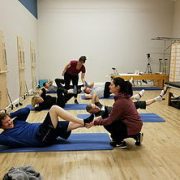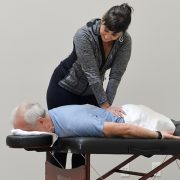The Big Reason why Back Pain Keeps Coming Back
If you’re reading this and you’re over the age of 40, odds are pretty good that you’ve experienced back pain at some point in your life. The odds are also pretty good that you’ve experienced back pain more than once.
Every few months or maybe once per year – your back “acts up”. You get rid of it – but it ALWAYS comes back.
Sound familiar?
Well… you’re not alone. Four out of five people are impacted by back pain, and for many, it’s a constant back-and-forth year after year.
But why? Why does back pain always seem to come back?
There are essentially two main reasons:
- Back pain is primarily addressed with “quick-fixes” and passive modalities
- You (or your doctor) let MRIs make the decisions about your treatment
Quick fixes and passive modalities…
This is the most common way people tend to address their back pain. And it’s the number one reason why it always comes back.
What is a passive modality? It’s something that is done TO you. It’s where you walk in somewhere, lay on a table, and you receive some kind of treatment. This could be chiropractic care, massage, craniosacral therapy, acupuncture, even injections and surgery. You have no active role in the process — it’s completely passive.
Now, I’m not saying there is anything wrong with these treatments. They are GREAT for getting rid or your back pain — and quite often quickly. And they are also great for helping you with other problems, such a stress relief. (I LOVE getting my massage once per month!)
But when your back pain keeps coming back, it’s a big sign something is missing. These treatments are only addressing your symptoms – for example – tight muscles, tension in your nerves, stiff or out of place joints. These things are all the result of your back problem – not the cause.
And it’s the number one reason why your back problem keeps coming back – because the root cause – the thing that is causing you to have tight muscles or stiff joints – is never addressed.
When MRI’s make the decision…
Traditionally, the medical community diagnoses your back pain with images. They use X-rays and MRI’s to see what’s going on inside your spine, and from there, they make a determination of what your treatment should be.
This is a big problem, because what shows up in your MRI isn’t always the reason for your pain. For example, your MRI might show a herniated or bulging disc in your spine. Your doctor will immediately blame that for your pain. And depending on how “bad” it looks, they may suggest injections or surgery. But the truth is, another person could have the exact same visual results as you on their MRI and have no back pain at all.
So why is it that one person can have a bulging disc with no back pain, and another person can have a bulging disc with excruciating back pain?
It’s because the root cause of back pain is more complicated than your anatomy. Research has shown time and time again that 80% of all back pain is primarily influenced by your habits and the way you move, not by what’s going on structurally in your spine.
So you can go in and cut out the disc, but if you don’t identify and correct your poor movement habits that led to that bulging disc in the first place — it’s either going to come back or bulge somewhere else. It’s why surgery only has a 50% success rate for helping people keep back pain away for the long-term.
If you’re confused right now – I don’t blame you.
It’s why so many people suffer from back pain!
It’s also why we offer the opportunity for you to come talk to us for FREE if you’re tired of suffering from back pain with no real answers.
Click here to request a FREE Discovery Session with on of my specialists.
You can also download this FREE GUIDE on how taking care of back pain on your own. It was written especially with the recent quarantine in mind – where so many people have been stuck at home and off their routines.
Either way, you should know that if you want your back pain to stop coming back — it IS possible. You just might have the wrong approach and could benefit from some specialist care to finally get you going in the right direction.










